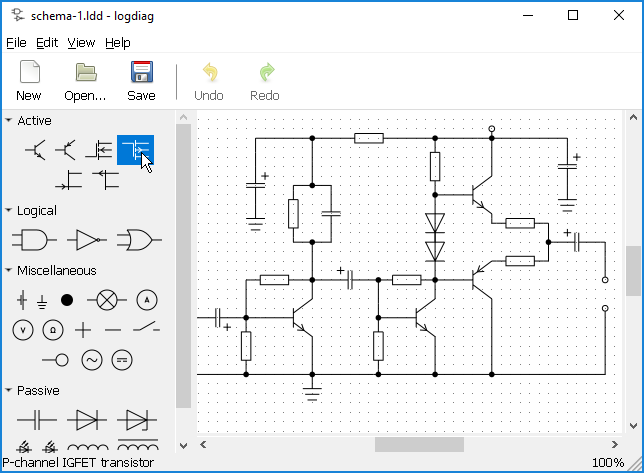But let's keep Lua in the downloader, to make cross-compiling easier.
logdiag
Packages
Regular releases are sporadic. git master should be stable enough. You can get a package with the latest development version from Archlinux’s AUR.
Windows installers can be downloaded from the Releases page on Gitea.
Requirements
Runtime dependencies: GTK+ >= 3.8, json-glib >= 0.10.4, lua >= 5.2
Build dependencies: CMake >= 3.10
Build from source on Unix-like systems
First check that you have all the required dependencies installed, including development packages, if your distribution provides them.
Reserve a directory for an out-of-source build:
$ mkdir build $ cd build
Let CMake prepare the build. You may change the directory where you want the application to be installed. The default is /usr/local.
$ cmake .. -DCMAKE_BUILD_TYPE=Release -DCMAKE_INSTALL_PREFIX=/usr
Now you have two basic choices of installing the application:
-
Using make install:
# make install
-
Using cpack:
You have to choose a package format understood by your system package manager. CMake offers DEB and RPM.
After cpack finishes making the package, install this file.
$ cpack -G DEB # dpkg -i logdiag-version-system-arch.deb
Build from source on Windows
Note that using the current method we’re stuck with GTK+ 3.8.2, which works worse on Windows 10, but better on XP and under WINE.
First, install CMake and MinGW (mingw32-base-bin, mingw32-gettext-dev). Ensure they’re both in your system path. If you want to build an installation package, also install NSIS. If you want to build within a path containing spaces, fix your CMake’s FindPkgConfig.cmake module to say:
separate_arguments(_pkgconfig_invoke_result UNIX_COMMAND "${_pkgconfig_invoke_result}")
Run the following command in the directory with source files to automatically fetch and set up all dependencies (note that Windows XP is no longer able to download from HTTPS sources, you’ll have to run this externally):
> cmake -P Win32Depends.cmake
Reserve a directory for an out-of-source build and let CMake prepare the build:
> mkdir build > cd build > cmake .. -G "MinGW Makefiles" -DCMAKE_BUILD_TYPE=Release
Now you can generate a package with CPack. You may choose between:
-
An NSIS-based installation package:
> cpack -G NSIS
-
A portable ZIP package:
> cpack -G ZIP
By default, that is if you specify no generator, both packages are built.
Cross-compilation for Windows
The procedure is almost exactly the same as before, including the requirements. Just install MinGW-w64 and let automation take care of the rest.
$ cmake -P Win32Depends.cmake $ mkdir build $ cd build $ cmake -DCMAKE_TOOLCHAIN_FILE=../ToolchainCrossMinGWW64.cmake \ -DCMAKE_BUILD_TYPE=Release .. $ cpack
Alternatively, for an unnecessarily bloated MSYS2-based 64-bit build:
$ sh Win64Depends.sh $ cmake -DCMAKE_TOOLCHAIN_FILE=ToolchainCrossWin64.cmake \ -DCMAKE_BUILD_TYPE=Release -B build $ cmake --build build — package
Contributing and Support
Use https://git.janouch.name/p/logdiag to report any bugs, request features,
or submit pull requests. git send-email is tolerated. If you want to discuss
the project, feel free to join me at ircs://irc.janouch.name, channel #dev.
Bitcoin donations are accepted at: 12r5uEWEgcHC46xd64tt3hHt9EUvYYDHe9
License
This software is released under the terms of the 0BSD license, the text of which is included within the package along with the list of authors.
